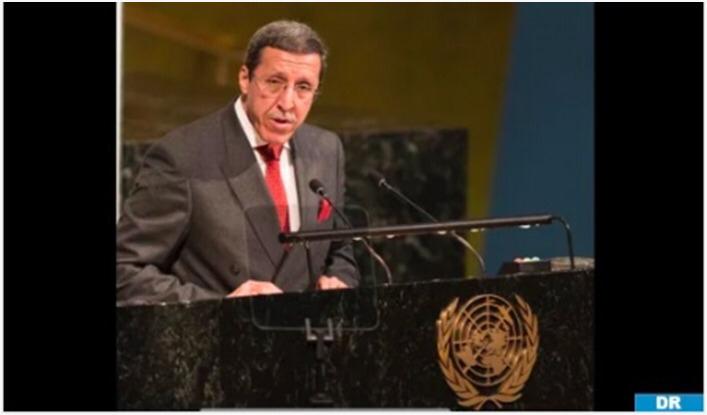
The United Nations’ General Assembly unanimously adopted, on Tuesday, a resolution presented by Morocco against the burning of the Holy Quran and hate speech.
This resolution “strongly deplores all acts of violence targeting people because of their religion or beliefs, and all those targeting their religious symbols and holy books … which constitute a violation of international law”.
The adoption by consensus of this historic and extremely important resolution occurs in a global context marked by the exponential exacerbation of hate speech in all its forms and dimensions. This testifies to the respect and esteem for the role of the Kingdom as a regional and global leader in promoting the values of peace, tolerance and interfaith and intercultural dialogue and reflects the leading role played by Morocco in the world in line with the High Guidelines and the enlightened and humanist Vision of His Majesty King Mohammed VI.
Presenting the resolution before the General Assembly, Omar Hilale, Ambassador, Permanent Representative of Morocco to the United Nations, recalled that this new resolution is the continuum of the historic resolution of the General Assembly (73/328), the first of its kind on hate speech, adopted in 2019, as well as the subsequent resolution (75/309) which proclaimed, in 2021, June 18 of each year as “International Day for the Fight against Hate Speech”.
The ambassador noted that the adoption of this resolution is part of the avant-garde, united and humanist vision of His Majesty King Mohammed VI, Commander of the Faithful, to fight against the danger of hate speech conveyed by violent extremism, obscurantism, populism, as well as racism of all kinds.
In this vein, he recalled the Royal message to the 9th Global Forum of United Nations Alliance of Civilizations which took place in Fez in November 2022, in which His Majesty the King warned: “Never before has our civilization been so exposed; never before has ‘living together’ come under such a threat, on a daily basis; rarely has the Other been perceived with such a level of suspicion, or used to stir up fear and foment hatred; radical positions are permeating the debate and canceling out moderate voices; religions are too often manipulated, when they are not simply stigmatized; populism is rocking societies and inventing questions without answering them, except to brandish migration as a scarecrow or an electoral weapon, and to turn migrants into scapegoats”.
Hilale further noted also that in order to face these multiple dangers, the Sovereign pleaded in favor of a policy of world solidarity, adding that in His message to the Parliamentary Conference on ‘Interfaith Dialogue” held in Marrakesh last June, HM the King stated that “the bleak picture reflected by the conflict of beliefs in the world today should not obscure the positive and bright aspects, nor the bold initiatives launched to strengthen communication and consolidate values rooted in tolerance, understanding and coexistence between the members of the international community, and between followers of different faiths”.
Also, the ambassador highlighted that this new resolution aims, primarily, to strengthen the collective commitment to promote a culture of peace and non-violence for the good of humanity and future generations, indicating that this priority is more pressing given that the last few months have been marked by an alarming rise in hateful and offensive acts in Europe against the beliefs of more than a billion Muslims. Hilale said that it is, by no means, about freedom of expression, but rather about hateful demonstrations targeting a particular religion and ethnicity, while pointing to a flagrant disrespect for religious minorities in these countries.
In addition, the Moroccan diplomat specified that the resolution notes with deep concern the increase in the number of cases of discrimination, intolerance and violence targeting members of many religious communities, mainly cases motivated by Islamophobia, antisemitism, Christianophobia, as well as acts of violence motivated by discrimination against persons belonging to religious minorities.
In the presentation of the Moroccan resolution, Hilale declined three concrete actions of the multilateral commitment to combat hate speech: The importance of developing a definition of hate speech agreed at the intergovernmental level, which can contribute to combating it, in accordance with international law; the convening of a global conference on combating hate speech in 2025; calling on member states and social media to support active systems to combat hate speech and prevent its further spread, and to promote users’ access to effective reporting mechanisms, in a manner consistent with international human rights law.
The adoption of this resolution was marked by an attempt by the European Union to remove the reference to the violation of international law when acts of violence are directed against religious symbols and holy books, which would have weakened the resolution. However, thanks to the insistence and leadership of Morocco, the European amendment was rejected by a large majority. Eventually, the European Union joined the consensus on the whole resolution.

